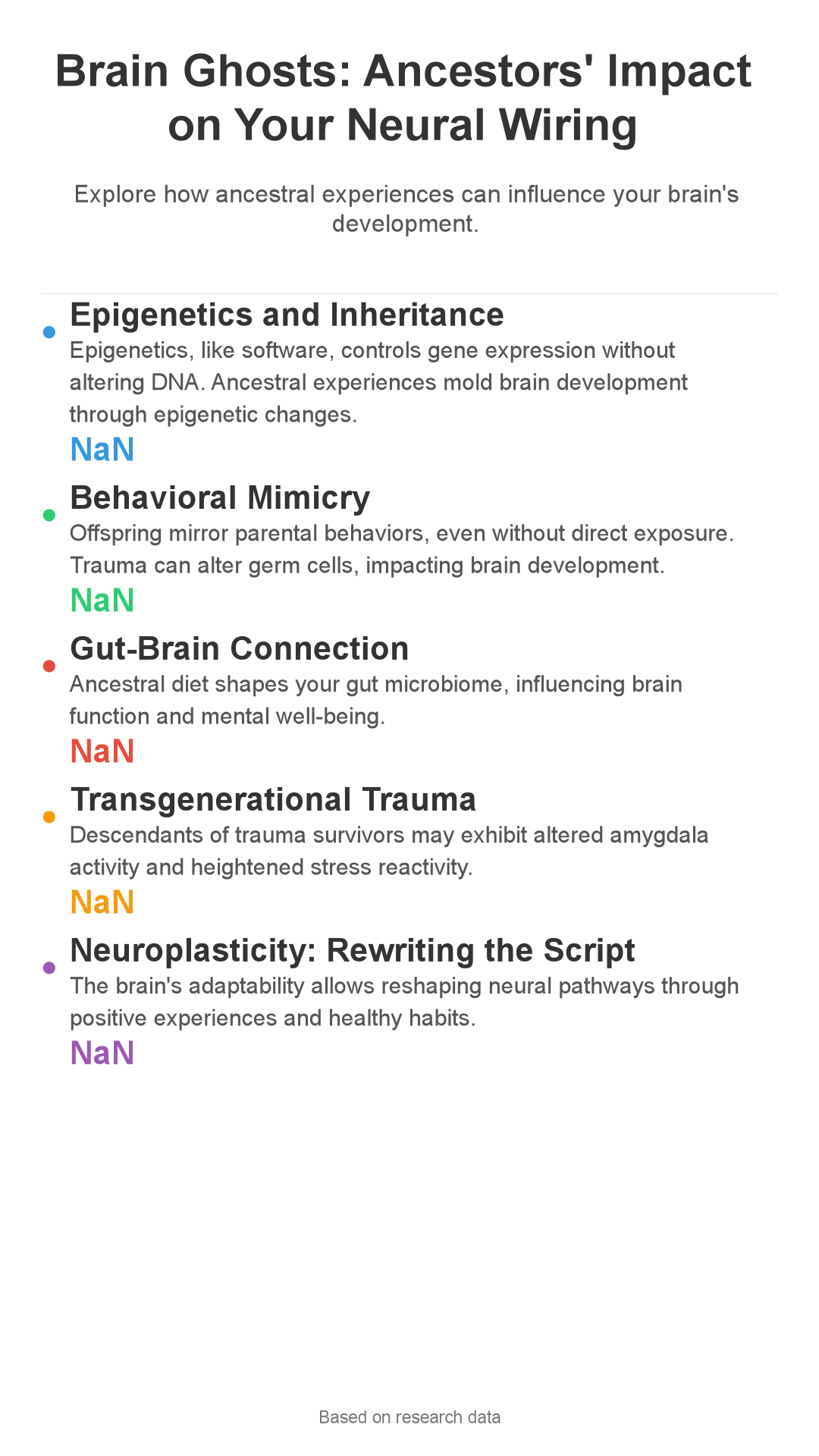
Did you know your brain might be haunted? Not by friendly spirits, but by subtle influences from bef
Ever wonder why you possess inexplicable fears, uncanny talents, or persistent habits? What if the blueprint for your thoughts, feelings, and behaviors was subtly sketched *before* your very first breath? Prepare for a fascinating, and perhaps unsettling, exploration into the echoes of generations past.
Buckle up, because we’re about to plunge into the captivating realm of transgenerational inheritance and neural echoes. Get ready to re-evaluate everything you thought you knew about yourself!
We’ll dissect the compelling evidence suggesting that neural patterns can ripple through generations, examine how these “neural ghosts” subtly influence our development, and explore the profound implications for self-understanding.
Ready to have your perspective shifted?
The Inheritance of Neural Predispositions: Beyond the Genetic Code
We all acknowledge the significant role genes play in shaping who we are, but that’s only part of the story. Enter epigenetics, a fascinating layer of complexity that operates *above* the genes themselves.
Think of your genes as the hardware, and epigenetics as the software that tells the hardware what to do. Epigenetics control how your genes are expressed – which ones are activated or silenced – without altering the underlying DNA sequence.
Epigenetics and Brain Development
Epigenetic changes are surprisingly sensitive to environmental factors such as diet, stress levels, and exposure to toxins. The crucial point? These alterations can be passed down to subsequent generations.
This implies that your ancestors’ experiences could literally be molding your brain’s development.
Behavioral Mimicry: Like Parent, Like Child…But Why?
A growing body of research demonstrates that offspring can exhibit behavioral patterns that mirror their parents’ experiences, even without direct exposure to those experiences.
Animal studies, for example, have revealed that rats exposed to trauma can transmit heightened fear responses to their offspring, even when those offspring are raised in a secure environment.
This suggests that trauma can alter the parent’s germ cells (sperm or egg), leading to epigenetic modifications that impact the offspring’s brain development and behavior.
The Gut-Brain Connection and Ancestral Influence
Did you know that your gut microbiome – the vast community of bacteria residing in your intestines – can influence your brain chemistry and development? And guess what? You inherit your initial gut microbiome from your mother at birth.
This means that your ancestral diet and lifestyle, which shaped your mother’s microbiome, can indirectly impact your brain function.
A healthy, diverse microbiome is associated with improved mental well-being, while an imbalanced microbiome may contribute to anxiety and depression.
Neural Echoes: How Ancestral Experiences Shape Our Brains
Now we venture into more speculative territory: the concept of “neural echoes.” This refers to the intriguing possibility that ancestral experiences can leave a subtle, yet enduring, imprint on our brains, influencing our predispositions and behaviors.
Transgenerational Trauma and the Amygdala
Research on transgenerational trauma has indicated that individuals whose ancestors endured significant trauma, such as the Holocaust or the Irish potato famine, may exhibit altered amygdala activity and heightened stress reactivity.
The amygdala is the brain region primarily responsible for processing emotions, particularly fear and anxiety. These individuals might be more vulnerable to anxiety disorders, PTSD, and other mental health challenges.
Inherited Memories: Fact or Fiction?
The notion of “inherited memories” remains controversial.
While there’s no conclusive evidence that we inherit specific, detailed memories from our ancestors, some researchers propose that epigenetic modifications can alter how our brains process information.
This could make us more susceptible to certain types of experiences or more prone to specific biases.
Cultural Practices and Ancestral Knowledge
Consider the cultural practices and traditions passed down through generations. Many of these practices embody ancestral knowledge and survival strategies.
For instance, certain traditional diets are perfectly suited to the local environment, providing optimal nutrition. Similarly, specific rituals and ceremonies may serve to strengthen social bonds and foster resilience in the face of adversity.
Rewriting the Script: Neuroplasticity and the Power to Change
So, does all this mean we’re simply puppets controlled by our ancestral past? Absolutely not! The remarkable aspect of the brain is its capacity for neuroplasticity – its inherent ability to adapt and reorganize itself throughout life.
The Brain’s Remarkable Adaptability
Neuroplasticity enables us to acquire new skills, recover from injuries, and modify our behaviors. It’s as if the brain is constantly remodeling itself based on our experiences.
By consciously choosing to engage in positive experiences and cultivate healthy habits, we can reshape our neural pathways and build a more resilient and fulfilling life.
Therapeutic Interventions: Reshaping Neural Pathways
Therapeutic interventions, such as trauma-informed therapy and mindfulness practices, can be incredibly effective in helping us reshape neural pathways shaped by ancestral trauma or negative experiences.
Trauma-informed therapy provides a framework for understanding how trauma impacts the brain and body, and equips us with tools for processing and healing from past experiences.
Cultivating Positive Experiences
The importance of cultivating positive experiences and supportive environments cannot be overstated.
Surrounding yourself with supportive people, engaging in activities that bring you joy, and prioritizing self-care all contribute to healthy brain development and resilience. Remember, you are not defined solely by your past.
Ethical Considerations: Understanding the Past, Shaping the Future
As we delve deeper into the mysteries of transgenerational inheritance and neural echoes, it’s crucial to consider the ethical implications. We must avoid falling into deterministic views of human behavior, where we believe our fate is predetermined by our genes or our ancestors’ experiences.
Avoiding Deterministic Views
It’s essential to remember that while our past may influence us, it doesn’t dictate our destiny. We retain the agency to make our own choices and shape our own futures.
Addressing Intergenerational Trauma
We have a responsibility to address intergenerational trauma and foster healing within families and communities.
This requires acknowledging the pain and suffering of past generations, providing support for those who are struggling, and creating opportunities for healing and reconciliation.
The Need for Further Research
Further research is needed to fully understand the complex interplay between genetics, environment, and neural development. This research should be conducted ethically and responsibly, with a focus on promoting human well-being and social justice.
So, what do you think? How does understanding these “neural ghosts” change your perception of yourself and your responsibility to future generations? Share your thoughts in the comments below!

Enjoyed this? Check out our YouTube channel for video versions!
Enjoyed this? Check out our YouTube channel for video versions!



